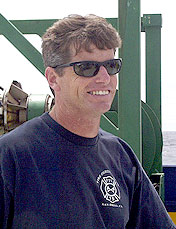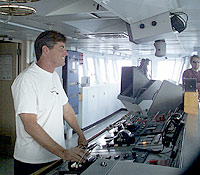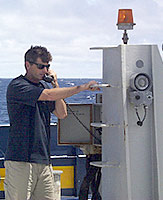|
|
Interviews: Captain Christopher Curl Chris works for the Scripps' Institution of Oceanography primarily as the Relief Captain for the Revelle and the Melville. He's also been in charge of Scripps smaller vessels the New Horizon and the Robert Gordon Sproul. "I jump around from ship to ship," he says. "Having my own ship, one of the two big ones, would be the next promotion, but I enjoy hopping around. I like the variety and change of scenery."
The best part about being a captain he says is not having anyone tell you what to do. His boss on land gives the captains freedom to run the ships as they see fit. "My responsibility is the overall safe operation of the vessel," Chris says. "I'm in charge of managing the vessel and making sure everybody is doing their job. Having a good crew is very important but you also have to keep an eye on them, instruct them and pass on your knowledge. And I do a lot of paperwork." So what makes a good crew? Generally one that is easy going, he says, willing to learn, open minded and not afraid to lend a hand. "A good crew is always looking after each other, and of course a little experience and job knowledge never hurt." Chris started sailing when he was 11 years old, racing 14-foot boats back and forth across Narragansett Bay, R.I. After high school in Italy, he attended the California Maritime Academy in Vallejo, Ca lif. A week after his graduation in 1983, he started working at Scripps as a seaman on the New Horizon.
Curiosity is partly what drove Chris into working for Scripps. "I'm interested in oceanography, always have been." He enjoys the opportunity to travel to unusual places and, along the way, "I feel like I'm improving humanity, helping to enlarge the knowledge pool." |
||||||
Mailing List | Feedback | Glossary | For Teachers | About Us | Contact
© 2010 Dive and Discover™. Dive and Discover™ is a registered trademark of
Woods
Hole Oceanographic Institution

 Christopher Curl is the captain of the RV Revelle for this
expedition to the Galápagos. He's lived through a 'Perfect Storm'
in the Pacific and has seen blue whales surfing ocean swells.
Christopher Curl is the captain of the RV Revelle for this
expedition to the Galápagos. He's lived through a 'Perfect Storm'
in the Pacific and has seen blue whales surfing ocean swells.

